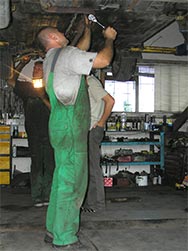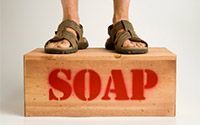10 comments Add a comment
A mechanic I know said to me he was cited and fined by our Ministry of Transportation for improperly certifying a vehicle, a foreign make. He had overlooked areas needing to be addressed as he was unaware of the safety codes required to be adhered to. He was written up, not because he was fraudulent or negligent, but for his lack of full knowledge.
His employer accepts no legal responsibility...
What beats me is that his employer, a car dealership, and as is the case with all the other car dealerships, accepts no legal responsibility for what happened so that he was left high and dry to pay a court fine of $500 out of his own pocket, plus all other incidental costs for parts to set the vehicle right. He had to volunteer his labor, naturally.
 Shouldn't the common law of principal and agency kick in to make his employer liable (vicariously) if the mechanic performs his job "in the course of his employment?" He's an employee, not an independent contractor, and employee who is presumably within the control and constructive supervision of the employer-company.
Shouldn't the common law of principal and agency kick in to make his employer liable (vicariously) if the mechanic performs his job "in the course of his employment?" He's an employee, not an independent contractor, and employee who is presumably within the control and constructive supervision of the employer-company.
I hit upon this interesting site and forum accidentally, and realized later that it is a UK gripe forum. Being in the Commonwealth, I'd have thought our laws and those of the UK are similar. I know many are imported from the mother country. If you have any thoughts on this, I'd love to hear from you - especially if you are in the legal profession or someone who's had a similar experience.
Thanks - a good feedback will be nice.
By: Sam
Leave a comment
Maybe Mr Adler has something to add to all that's been said and argued about the law of agency and the subject of vicarious liability as affects the employer. Let's hope he surfaces to lend a hand.
I will return to Chris's response, and thanks for putting down your thoughts.
The Canadian Government may have taken the view that the MOT check is of such importance that people licensed to carry on the work need to be personally liable. To some extent. Once they have signed off the car there is no other line of defence between the MOT checker and, potentially, a dead pedestrian. It's about responsibility (obviously) and whether the vigilance and care taken in checking every single car is applied with the same vigour each time. And not just about abusing the position by pocketing the cash. An MOT may not be big money, but some will see it as legally enforced extortion.
However, airline pilots are licensed and invariably take out loss of license insurance, mainly in the event they find themselves unable to pass a medical and lose their license and their employment. Is there nothing similar that covers MOT checkers and the risks they run? It may be that your friend's only remedy is through (expensive?) insurance cover.
What is disheartening is that the small man I call the ham and egger has so little clout, that his voice cuts no ice no matter what he says and to whom he says it. It takes time and money to file an appeal after appeal. We pay post haste when the judge hollers, "Your fine is $500."
I'm still hung up on this common law theory as I am with legal precedents consistent with work done "in and within the course and scope of his employment." On this alone lies the lynch-pin to hold the case together.
So if an employee does his work that is not within his job descriptions (he goes on the roof when he is not authorized to do so), or if does it outside his working hours, then he has himself to blame for legal problems arising.
Put this this way: he's a cab driver and he's legally protected for what he is paid to do during his normal working hours. But when he drives the cab after hours in his own time for extra pocket money for cigarettes and beer and gets his unauthorized passengers injured, his company would certain disclaim any responsibility. This I can live with.
A parting shot - the mechanic I referred to is fully qualified, exercised due care, and in no way negligent. So why was he hanged?
On second thoughts, by your assessment, Ray, maybe he IS qualified to work on North American cars but NOT qualified to service VW or Audi so that his employer is to blame for not giving him the proper training and guidance. Was this made clear to anyone when the MOT certified him as "unconditionally qualified?" A moot point.
,
If I employ person A to work in a shop, I have made a judgement on that persons suitability for the position. If person A then does something wrong resulting in a criminal or civil law suit, as their employer I have to show that full and proper training was carried out. Not only that, but I have to show evidence that this person understood the training given.
Its gets more complicated if there is a training requirement which person A was aware of but did not raise with his employers. Likewise if some of the training was given elsewhere. In this case the employers could be forgiven for having the understanding that the person was fully qualified when in fact they are not. Then BOTH parties should be liable. Another consideration is the severity of the shortcoming. A shop assistant selling solvents to a 12 year old in the UK is personally liable for a prison sentence or fine up to £5000 unless it can be shown that the company did not have due diligence in traing, in which case, the company is also liable.
By the way, I did not address your point as I should have. First off, I don't the see the soldier-and-war crime commission analogy as apposite; no offense intended. I hope I had made it quite clear, ab initio, that the man involved was 'clean,' in a manner of speaking, but plain unlucky.
To wit, apart from his contractual obligations and notwithstanding his limited insurance coverage as issuing from his employer's blanket policy to protect everyone working in the company, the man was held liable in crime and in tort. This fact called for the fine, at worse imprisonment, and the compensation to the injured party, right?
The nature of his guilt or culpability, I suspect, in retrospect, springs from his failing to exercise proper duty and standard of care - not from negligence. He simply was not familiar with the requisite legal procedures under a highway traffic Act. No question of strict liability attaches to this case, not the way I see it.
Let's hear from other readers. As for the mechanic, his case has been summarily disposed of a few days ago. But the academic question still lingers, and I'd like some consumer advocate to rise to the occasion to help with his opinions on how to redress the 'wrong' so that he and those in his shoes get a fair shake in the court of law. That's all.
The other consideration is that the mechanic, more a technician by my standard, is qualified and certified by our Ontario MOT to conduct his duties and responsibilities on a day-to-day basis without hindrance. The man is no slouch.
Fraud or negligence is not the issue. The issue is the questionable jurisprudential basis of the act of discrimination whereby the law of principal and agency does not seem to protect the man while others are protected. The standard test ostensibly has always been whether such a person conducts his work in the course and scope of his employment, or in his personal capacity.
Take Lord Conrad Black: his felony case and court costs were covered by his company Hollinger International almost to the hilt. Apart of his employment contract, presumably, his insurance's doctrine of subrogation I'm sure plays into the court proceedings - and here, fraud was presumed to have been proved. I'm not legal expert or an analyst, but his being in Coleman slammed on a six-year term in Florida is proof of his culpability, rights?
Right on, Dandy. The ham and egger gets the shaft all the time; the privileged - if they can get away - walk away. We should slag and burn those CEOs who walk into the lush greenery of the fairways with millions and billions while the man-in-the-street loses his shirt and pension. Social justice for you!
Criminal negligence means prison, and any or everyone can go there, directors/employers or workers.
I'm not a legal expert, this is just my opinion but at the end of the day that's the sensible approach I think. There again, those in power and those that have the money tend to care less about those who can be exploited!






mick
Stumbled on this site can anyone advise me.My car was towed in to a garage and told that is was beyond reasonable repair. But I was told this by the mechanic not the owner and this mechanics went on to sell me a car that just passed its mot 5 days ago. When driving out of the garage I returned it in poor state ie: brakes metal to metal knocking on steering and also lots of other problems. I was told by the mechanic he would replace the brake disks and repair the steering I said no I would like my money back he refused. I took the garage to court and the judge said the mechanic was to blame and I would have to start a claim against him and advised him he would be liable. In court the owner of the garage said all his staff could buy and sell cars for their gain on his insurance and said one side of the forecourt was for the mechanics and the other for the garage.Also the mechanic produced in court a print out from a computer of the bill of sale signed and dated by both parties with the original date from when he bought and this was not the original nor a copy but a print out that anyone could have done. Now there's another twist this print out is the wrong registration. Being the fact the the owner said all his staff could buy and sell cars should he have a poster explaining this to the public because how was I to know if I was dealing with the garage or the mechanic.I have an appeal date on the 20th December 2013 I have been in touch with some insurance companies who informed me this could be against the law and could be known has fronting.
love to hear from anyone